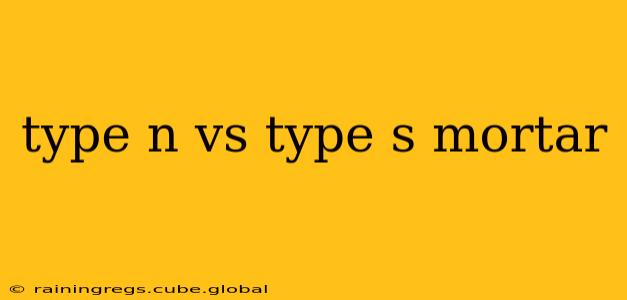Choosing the right mortar is crucial for any masonry project, impacting both the structural integrity and longevity of your work. Two common types, Type N and Type S, often leave builders wondering which is best for their needs. This comprehensive guide breaks down the key differences, helping you make an informed decision.
What is Mortar?
Before diving into the specifics of Type N and Type S, let's establish a foundational understanding of mortar itself. Mortar is a binding agent used in masonry construction to hold bricks, blocks, and stones together. It's a mixture of cement, lime, sand, and water, each component contributing unique properties to the final product. The specific proportions of these ingredients determine the mortar's type and its suitability for different applications.
Type N Mortar: The Versatile Choice
Type N mortar is a medium-strength mortar, offering a balance of workability and strength. Its versatility makes it suitable for a wide range of applications, including:
- Residential construction: Type N is often preferred for less demanding applications in residential buildings, such as laying brick veneer or constructing less structurally significant walls.
- Interior applications: Its moderate strength makes it well-suited for interior masonry work where high compressive strength isn't paramount.
- Repairs and restoration: In some cases, it can be a suitable choice for repairing existing masonry where the original mortar was of a similar type.
Key Characteristics of Type N Mortar:
- Moderate compressive strength: It provides adequate strength for many applications but isn't as strong as Type S.
- Good workability: It's relatively easy to work with, making it a popular choice for DIY projects and less experienced masons.
- Moderate water retention: It retains moisture adequately for proper curing, but not excessively.
Type S Mortar: High Strength for Demanding Projects
Type S mortar is a high-strength mortar designed for applications requiring superior compressive strength and durability. Its robust properties make it the preferred choice for:
- High-load bearing walls: Structures needing to withstand significant weight, such as retaining walls or foundation walls, benefit greatly from Type S's strength.
- Exterior applications: Its increased durability makes it ideal for projects exposed to harsh weather conditions.
- Seismic zones: In areas prone to earthquakes, the higher strength of Type S is crucial for structural stability.
Key Characteristics of Type S Mortar:
- High compressive strength: Provides superior strength and durability compared to Type N.
- Lower workability: It can be slightly more difficult to work with than Type N, requiring more experience.
- Lower water retention: This can be beneficial in preventing excessive moisture absorption, especially in exterior applications.
Which Mortar Should You Choose? Type N vs. Type S: A Comparison Table
| Feature | Type N Mortar | Type S Mortar |
|---|---|---|
| Compressive Strength | Moderate | High |
| Workability | Good | Lower |
| Water Retention | Moderate | Lower |
| Cost | Generally less expensive | Generally more expensive |
| Applications | Residential, interior projects | High-load bearing, exterior |
What are the Differences in Durability?
The key difference lies in compressive strength. Type S mortar significantly outperforms Type N in its ability to withstand compressive forces. This translates to greater durability, particularly in projects exposed to high stress or harsh weather conditions. Type N, while durable for its intended uses, is less suited for projects with significant structural demands.
What is the Difference in Cost?
Generally, Type S mortar is slightly more expensive than Type N. This price difference reflects the higher quality ingredients and the increased strength it offers. However, the added cost can be justified by the enhanced durability and structural integrity it provides in appropriate applications.
Which Mortar is Better for a Chimney?
For a chimney, the high strength and durability of Type S mortar are crucial. Chimneys are subjected to significant temperature fluctuations and potential structural stress, making Type S the safer and more reliable choice.
Conclusion
Selecting the appropriate mortar type is a critical decision in any masonry project. Understanding the strengths and limitations of Type N and Type S mortar allows you to make an informed choice that ensures the structural integrity and longevity of your construction. While Type N offers versatility and ease of use, Type S provides superior strength and durability for more demanding projects. Always consult local building codes and professional recommendations to ensure compliance and optimal results.
